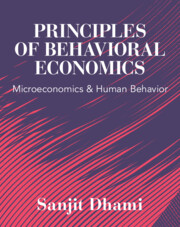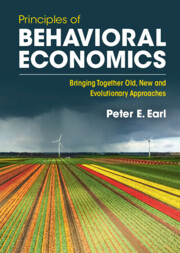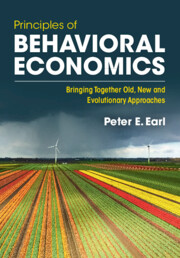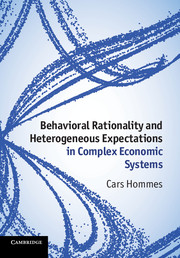Principles of Behavioral Economics
Principles of Behavioral Economics, written by an acknowledged leader in the field, provides a comprehensive introduction to one of the most exciting areas of modern economics. It demonstrates how models of economic theory can be enriched by using interdisciplinary insights from psychology, sociology, evolutionary biology, and neuroscience to build the basis for a more empirically supported set of economic principles. Unique in its level of rigor and lucidity, the book highlights the important link between theoretical and empirical economics by demonstrating the usefulness of a range of data sources such as observational data, lab data, survey data, and neuroeconomic data. This field-defining textbook argues that behavioral economics is not just a supplement to mainstream economics. Taking behavioral economics seriously requires a total rethink, and eventual transformation, of every area of economics.
- Brings students to the cutting edge of modern research where some of the most important and unresolved challenges lie. But it does so at a level that is appropriate for the undergraduate degree. There is no book at this level that exposits the range of frontier challenging material covered in the book
- Examines the empirical evidence that tests existing economic theories
- Provides evidence that people use a range of alternative methods to make decisions that are based on using simple rules of thumb, or heuristics, that sometimes lead to biases in decisions but economize on scarce cognitive resources
- Provides the relevant evidence using several kinds of data: Observational data, lab data, survey data, and neuroeconomic data
Reviews & endorsements
‘Again, Sanjit Dhami has written an utterly fascinating book - this time aimed at teaching behavioral economics to undergraduates. It is the perfect book for that. But it is also the perfect book for anyone who wants to know how behavioral economics fits into standard economics, and then, further, how it fits into the social sciences as a whole. Every economist, and every social scientist, will learn a lot and find great pleasure in Principles of Behavioral Economics.’ George Akerlof, Nobel Laureate in Economics 2001; University Professor, Georgetown University
‘A masterful blend of theory and empirical evidence, this is an essential resource for students and researchers, and a must-read for anyone interested in the future of economic thought.’ Ernst Fehr, Professor of Economics, University of Zurich
‘Sanjit Dhami, author of the definitive graduate textbook on behavioral economics, has brought his wisdom, eloquence, and clarity of writing to the creation of an equally impressive volume aimed at undergraduates. In-depth and comprehensive, this book is perfect for year-long course sequences or for intelligent laypeople who want to gain a deep familiarity with the field.’ George Loewenstein, Herbert A. Simon University Professor of Economics and Psychology, Carnegie Mellon University
‘Because of its rapid growth and many connections to other disciplines, behavioral economics has sometimes appeared to be a rich but somewhat disparate collection of theories and models, empirical findings, and puzzles. With this landmark textbook, we finally have a comprehensive, unified, and remarkably pedagogical treatment of the entire field, seamlessly integrated with micro and game theory, experiments, and real-world applications. It will undoubtedly become the reference textbook for undergraduate courses on the subject, and the natural entry point into the field for many other readers.’ Roland Bénabou, Theodore A. Wells ’29 Professor of Economics and Public Affairs, Princeton University
‘In Principles of Behavioral Economics: Microeconomics and Human Behavior, Sanjit Dhami offers a companion volume, accessible to undergraduates, to his landmark graduate-level survey of behavioral economics, Foundations of Behavioral Economic Analysis. Like its predecessor, the companion volume is distinguished by its detailed yet readable coverage of theory and evidence and its balanced discussion of the philosophical and methodological differences and similarities between behavioral and neoclassical approaches to microeconomics. Interested undergraduates will gain from reading this masterful book.’ Vincent P. Crawford, Professor, University of California, San Diego and University of Oxford
‘This is an outstanding undergraduate textbook in behavioral economics. It not only highlights key results in the field but also conveys the excitement of our ongoing quest to make economics truer. I highly recommend it to all.’ Xavier Gabaix, Pershing Square Professor of Economics and Finance, Harvard University
Product details
April 2025Hardback
9781009422338
698 pages
259 × 207 × 45 mm
1.63kg
Available
Table of Contents
- Part I. Behavioral Decision Theory:
- 1. The traditional approach to decision making under risk and subjective uncertainty
- 2. Modern approaches to decision making under risk and subjective uncertainty
- Part II. Other Regarding Preferences:
- 3. Evidence on human pro-sociality, morality, and ethics
- 4. Theory and applications of pro-social behaviour
- Part III. Behavioral Time Discounting:
- 5. The traditional approach to time preferences
- 6. Behavioral approaches to time preferences
- Part IV. Behavioral Game Theory
- 7. Introduction to behavioral game theory
- 8. Topics in behavioral game theory
- Part V. Bounded Rationality:
- 9. Bounded rationality I: judgement heuristics
- 10. Bounded rationality II: topics in bounded rationality
- Part VI. Further Topics in Behavioral Economics:
- 11. A smorgasbord of topics in behavioral economics
- 12. Behavioral welfare economics.






